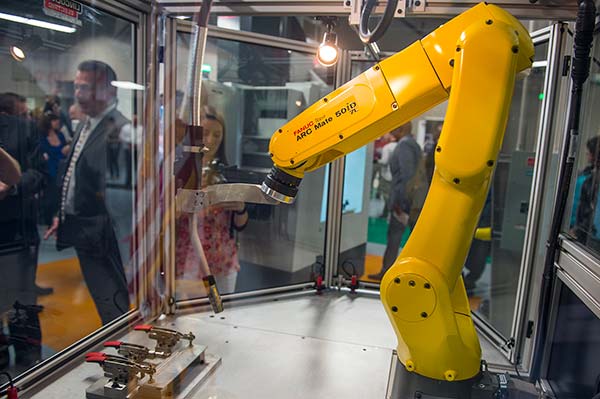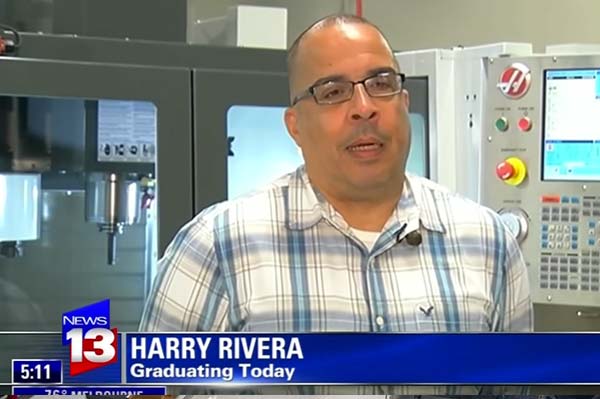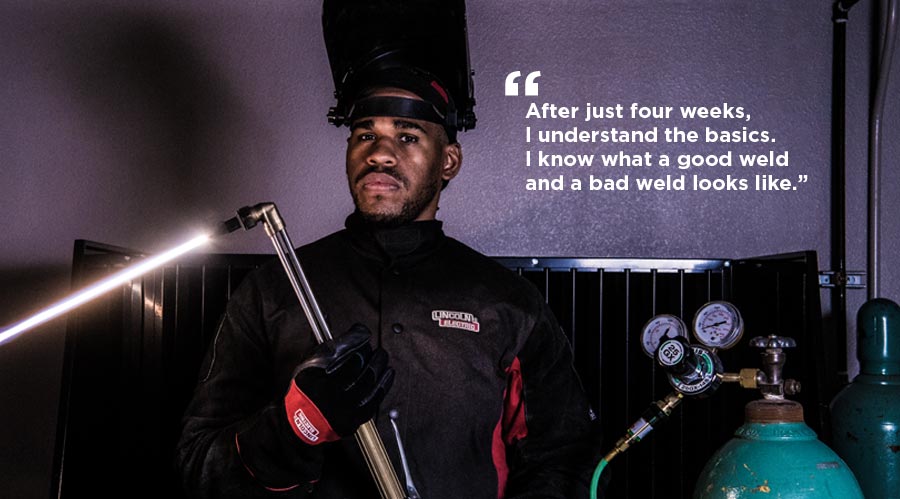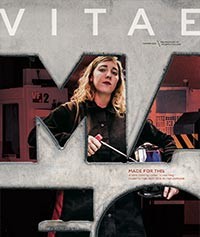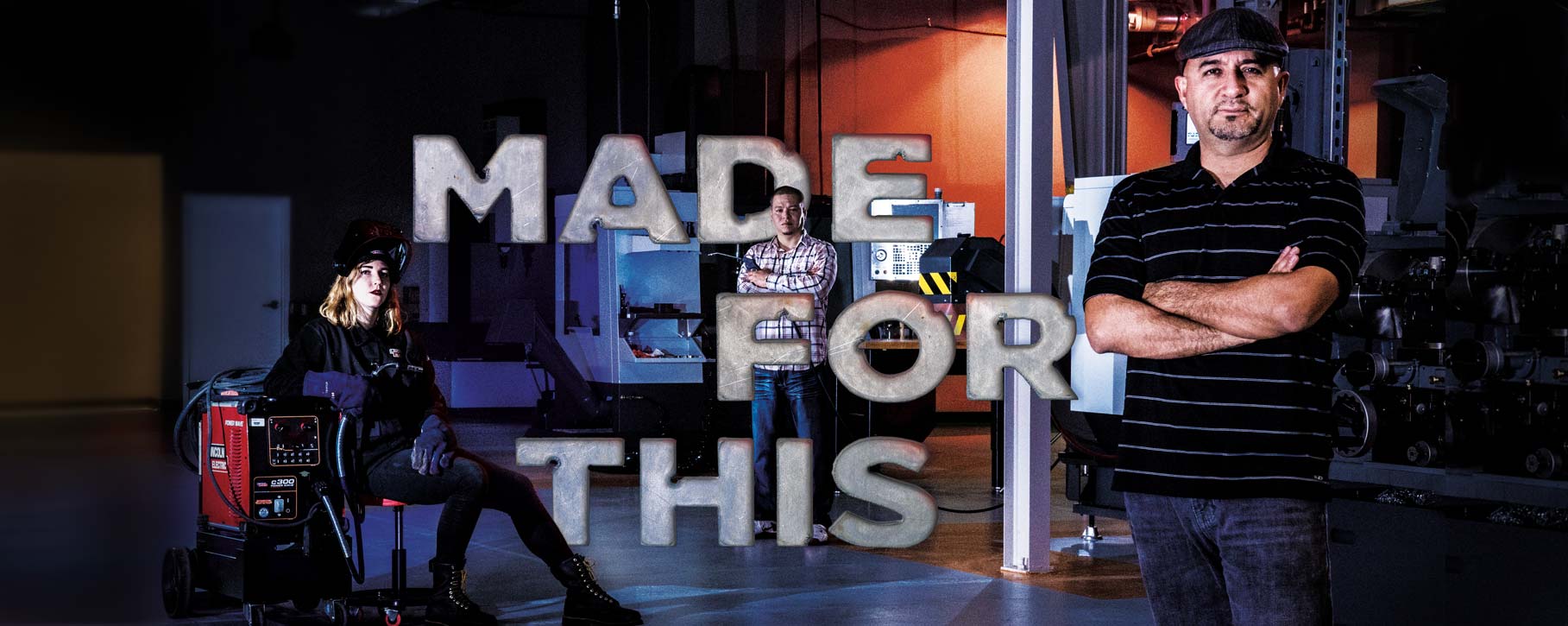
//BY CHRISTOPHER BOYD
Valencia’s new manufacturing training center provides students with valuable skills and employers with much-needed workers.
From Detroit’s automobile assemblers to aircraft-factory riveters in Seattle, blue-collar workers provided the muscle for the nation’s 20th century manufacturing revolution. Yet as anyone who recently has driven past a rusting industrial-era relic knows, the heyday of Made in America is over and the jobs are gone.
Or are they?
Although the public still associates manufacturing with plant closings and job losses, a radically different story is taking shape. From coast to coast, smokestacks are giving way to high-tech cleanrooms, and production workers are nearly
as likely to sport lab coats as coveralls and steel-toed boots.
Valencia College launched a new program last winter to help prepare a workforce for the increasingly technical task of making products. The college’s Advanced Manufacturing Training Center near Kissimmee is a mixture of computer-equipped classrooms and work areas where students gain experience using giant robotic tools.
Students still learn to weld and assemble, but they spend nearly as much time mastering computer coding and absorbing industry standards. In the new manufacturing economy, a diverse set of skills is as valuable as a tool box was to earlier generations of workers.
“We’re teaching critical thinking and problem solving,” said Carl Harris, the training center’s director. “You could think of what we’re doing as on-shore manufacturing.”
Countless companies have assigned their manufacturing tasks to plants overseas, but Harris said the flow is shifting. For myriad reasons, including the expense and time involved in ordering from international suppliers, U.S. companies are selectively returning to domestic production. But it’s different this time.
Many new products are designed on computers and built by robots, and highly skilled workers are needed to tend the machines. And new products require precision production and rely on machine operators trained in the workings of complex equipment. For Valencia, the need for workers
was a call to action.
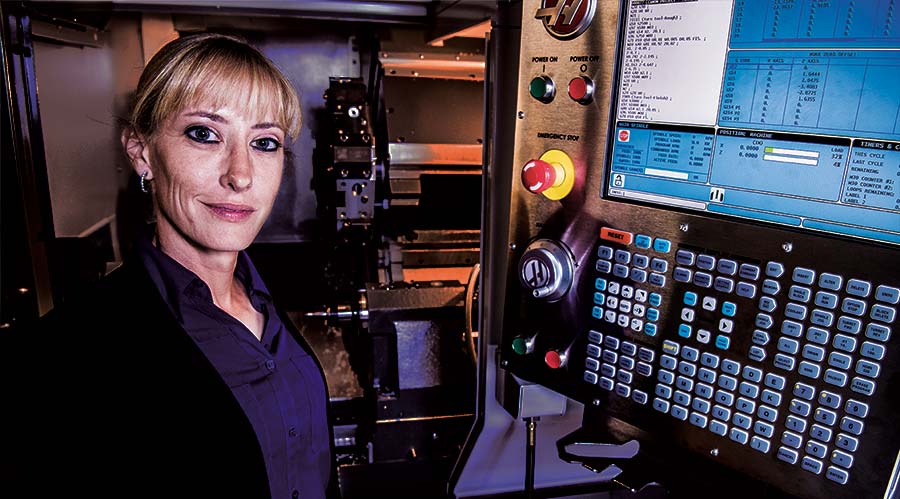
Heather Mann is wrapping up her program in CNC machining, which uses computer programs to operate lathes, mill, routers and grinders.
Students from Everywhere
The Advanced Manufacturing center’s first official class of 19 graduated in February, the same month remodeling was finished on its 17,000-square-foot building on Shady Lane, just west of Florida’s Turnpike. The building, originally designed to make Colt firearms, was transformed into a classroom and workshop center, replete with a welding area with 10 welding booths and assembly labs and quality-control labs where students gain hands-on training.
Signs of a fresh launch abound at the center, where newly installed windows still have manufacturers’ stickers attached and the walls of faculty offices are devoid of decoration.
Harris said the program, largely funded with $2.5 million in grants from U.S. Departments of Labor and Education, provides a student with 400 to 625 hours of training. Each learns a specialty such as Computer Numerical Controlled (CNC) machining, product and parts assembly, quality and inspection, and welding.
The students arrive with assorted skills. Some are military vets, others worked in Central Florida’s colossal tourism and hospitality industry, and even more arrive without specific skills, often through referrals from employment organizations. All want more from their lives, and manufacturing, where starting wages typically range from $12 to $20 an hour, offers a path.
“It’s been life-changing for me,” said Harry Rivera, 57, who graduated with the new center’s first class in February. “I’m proof it’s never too late to learn. I was nervous, since the last time I was in school was the 1980s.”
Rivera, who worked for many years in commercial printing, was laid off in 2013 and turned to temp jobs, concluding his old line of work held few opportunities. One of those placements was at CareerSource of Central Florida, where he worked in the resource room helping others research job openings. As he was browsing the materials, he discovered the Advanced Manufacturing program.
“It was an epiphany for me,” he said. He liked the length of the program—about four months—and his specialty, machine operation. After completing the course work, and getting first-hand experience on the program’s fabrication equipment, Rivera earned an industry certification, a credential he said makes him highly marketable.
Mimi Coenen, chief operating officer of publicly funded employment agency CareerSource Central Florida, said Advanced Manufacturing is among a growing number of programs that fit the nation’s new labor market. Since so many workers change jobs every few years, often to completely new fields, re-education is a must.
“Lifelong learning is the new normal,” Coenen said. “People want short-term training, adding to the value of things they already know.”
Learning a skill before looking for work can pay off.
“The goal is to help people bring their talent out,” Coenen said. “Businesses are looking for creative thinkers. These aren’t your grandfather’s grease and sawdust manufacturers.”
CareerSource not only directs students to the program, it helps them find work after they finish. For instance, it arranges internships that allow businesses to evaluate newly minted graduates while furthering their training.
Certificates Instead of Degrees
Though Valencia offers career training in an assortment of fields, most programs lead to academic degrees. Through Advanced Manufacturing, students prepare for industry certification in machine operation, welding, logistics, quality control and inspection, production and other specialties in as little as 12 weeks.
Fifty-five students started in the February class, and the college expects enrollment to climb to as many as 200 by the end of this year.
“Valencia realizes that some students can’t take two years to compete a degree,” said Marc Stanakis, president of Orlando-based Jobs Partnership of Florida. “What is needed is short-term training options where you can quickly get a job and start earning money.”
Jobs Partnership is one of the nonprofit organizations that support the new program. Stanakis’ group helps about 240 people a year find new work through its own 12-week classes. He said attending the Valencia program would be a good next step for his clients, who in many cases are among the long-term unemployed.
pow
“These are non-traditional students who have no concept they are capable of doing these things,” he said. “They don’t know about programs like this and that they can be afforded opportunities to learn new skills.”
Valencia’s Advanced Manufacturing Training Center in Osceola County is officially “powered on.”
Stanakis said that Advanced Manufacturing rides a new wave in education. For many years, he said, secondary education has focused on college prep, and college training was a path to a traditional degree. That left out students who weren’t inclined to enroll in college, or even finish high school.
“The understanding that not everyone is going to college was somehow lost,” Stanakis said. “That is beginning to change, but there is a long way to go.”
Some Advanced Manufacturing students have experience in their fields and want to broaden their skills, but most are trying something new. Valencia is using its many community ties to get the word out through partnerships with companies, social services and government.
Several Advanced Manufacturing candidates came through the justice system. The Osceola County Corrections Department sent three students, all serving probation, to the program in February.
“People face a lot of barriers when they get out of jail,” said Leigh-Ann Cuddy, a supervisor with Osceola Corrections. “This program doesn’t require a GED (high school equivalency diploma) and it can lead to a good paying job.”
Javid Roach, one of the corrections department’s referrals, took the welding course earlier this year. He said that he’d spent years working in what he considered dead-end jobs and is excited about his new training.
“I was on probation and didn’t have any idea where I was going,” the 25-year-old Roach said as he held an electrical welding tool to a thin bead of metal. “After just four weeks, I understand the basics. I know what a good weld and a bad weld look like. I know how to grind metal and how to use an acetylene torch. It’s amazing. This could be the best move I ever made.”
A Manufacturing Hub in Need of Skilled Workers
More than 18,000 manufacturers have Florida operations, 1,700 of them in metro Orlando and nearby counties. Company managers almost universally lament that many of their veteran workers are nearing retirement age, and most are uncertain where they’ll find replacements. Manufacturers provide for upwards of 300,000 Florida jobs, and Enterprise Florida, the state’s labor division, says 40 percent of them could be vacated within a decade as baby-boom workers retire.
Valencia began offering manufacturing courses in 2012 under an initial $683,000 federal grant, and graduates found work locally. Ray Aguerrevere, vice president and general manager of Custom Metal Designs, Inc. in Oakland, Fla., said he is thrilled with the three workers his company hired.
“It’s hard to fill technical jobs,” said Aguerrevere, whose company employs around 70 workers and makes conveyor belts and parts for the manufacturing industry. “Unfortunately, we don’t have internal training facilities like larger companies.”
Job preparation, he said, is key. Decades ago, many high schools offered the non-college-bound vocational education and, after graduation, those students were ready to find work. But Aguerrevere said many old-fashioned manufacturing jobs moved overseas, or simply vanished as advanced machinery eliminated the need for people.
“Most of the manufacturing that stayed in the United States is high-tech, high-skilled work,” Aguerrevere said. “The lower-skilled jobs won’t come back.”
Aguerrevere also bemoaned the large wave of workers soon to retire.
“There’s a knowledge gap and a lack of people out there who can backfill the roles of those leaving,” Aguerrevere said. “Without a program like Valencia’s, it’s hard to find workers ready to come through the doors.”
Jobs Await Those with Skills
Advanced Manufacturing grads have landed an assortment of Central Florida jobs. Among the employers: TriQuint/Qorvo, .decimal, Mitsubishi Hitachi Power Systems and the regional giant, Lockheed Martin.
Lockheed, with about 12,000 Florida workers, is a technology and manufacturing employment magnet. It has multiple divisions in metro Orlando, one of which makes electro-optical sensor systems that equip fixed and rotary winged aircrafts for the U.S. Government and Allied Partners. In addition to its own workforce, Lockheed awards about $5.1 billion in contracts annually to 1,600 Florida-based suppliers.
Pat Sunderlin, vice president of procurement at Lockheed’s Missiles and Fire Control division, said a high-skilled workforce is imperative, and he looks to programs like Advanced Manufacturing to fill the need.
“Florida is committed to growing high-tech industries, however, the talent pipeline is insufficient to sustain our business needs,” Sunderlin said. “Creating future success depends on collaboration of industry, educators and policymakers.”
Lockheed signed on as one of the Valencia program’s private-sector partners, a move the company says benefits itself and Florida.
“Training employees in advanced manufacturing techniques is critical to the future of Central Florida’s manufacturing industry,” Sunderlin said. “Not only do we rely on our own employees to be proficient in high-tech production processes, but we depend on our many suppliers in the area to have highly skilled workers to meet our precise quality and performance standards.”
Roberto Velez, a February alumnus, is among Lockheed’s new hires. Velez, 20, graduated from the Osceola County School for the Arts without a plan. He’d considered enrolling in a Valencia academic program, but said he didn’t want to take the step without a goal.
“After graduation, I took time off to decide what to do with my life,” he said. “I’d lost any real direction toward the end of high school and hit a blank stop.”
He was living with his parents when he learned about the manufacturing program. It was, he said, a life changer.
“When I first went into it, I was kind of nervous,” Velez said. “I mean, when you think about manufacturing, you think about standing at a conveyor belt, putting things together.”
Though he was quite sure that wasn’t for him, he was nevertheless tempted. After a few days of introductory evaluation, he opted for the program’s Certified Production Technician track, which taught him how to solder circuit boards.
“I was in creative writing and did a lot of drawing in high school, so I liked the idea of holding a soldering iron,” he said. “It’s like a pen.”
He had his doubts at first, but soon decided he liked it. His instructor, who Velez said has done similar work at Lockheed for 31 years, inspired him. Soon after Velez began searching for work, Lockheed made an offer.
“This all happened so quickly I’m still reeling,” he said. “I’m still trying to realize I made it this far and I’m in the manufacturing business now.”
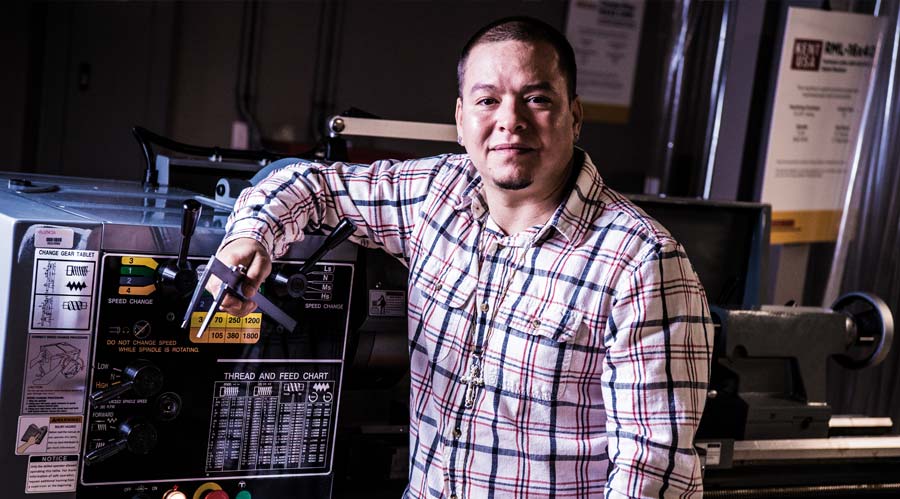
Angel Maldonado, who has worked as a forklift operator and in a variety of warehouse jobs, is excited by the job prospects in the advanced manufacturing field.
Angel Maldonado, who has worked as a forklift operator and in a variety of warehouse jobs, is excited by the job prospects in the advanced manufacturing field.
Private Partners Unlock Opportunities
Joe Battista, Valencia College vice president for global, professional and continuing education, said Lockheed is a tremendous help.
“Lockheed Martin has been working on our curriculum in ways that make our students more employable when they graduate,” Battista said. “We discovered how large the demand for skilled workers is, and we felt this was something the college should become involved with.”
Part of the need comes from the move away from vocational training in high schools.
“There was a sense that manufacturing was going away and that we had to train people for something else,” Battista said. “Then it turns out there is real demand.”
Battista said the college heard about the need from local businesses.
“Industry people tell us they need workers with hands-on training,” he said. “They need people who have actually touched machines.”
And Battista said demand is growing. The Advanced Manufacturing Training Center is located close to the International Consortium of Advanced Manufacturing Research, an Osceola County initiative that is expected to spur manufacturing
just as Lake Nona’s Medical City project drew research and treatment facilities to southeastern Orange County. The $70 million center is planned to open in 2017.
Sherry Reeves, executive director of the Manufacturing Association of Central Florida, said word is spreading about manufacturing career options.
“You mention manufacturing to kids, and they react as if it’s a job for losers,” Reeves said. “But there are real opportunities. What’s great about Valencia’s program is that it assesses, tests and certifies people. Businesses really look at that.”
Carly Faren, 22, said she bounced from dance school in Boston to the University of Central Florida before enrolling in the manufacturing center’s welding program, where students learn on state-of-the-art welding equipment donated by Lincoln Electric. For the first time, she said, she sees a path to something she really wants to do.
“I didn’t know anything about welding when I walked in here,” Faren said after taking off her welding helmet for lunch break. “But it didn’t take long. This is the first time in my life I’m doing something that really feels right.”
Welding instructor Jason Becker, a former iron worker, said the career options for Faren and his other students are varied, and the pay can be impressive.
“Students can come out of here making $30,000 to $40,000 a year,” Becker said. “Even more, they leave knowing that they have a trade. Welders are becoming cool again, and people don’t want to leave the field.”

